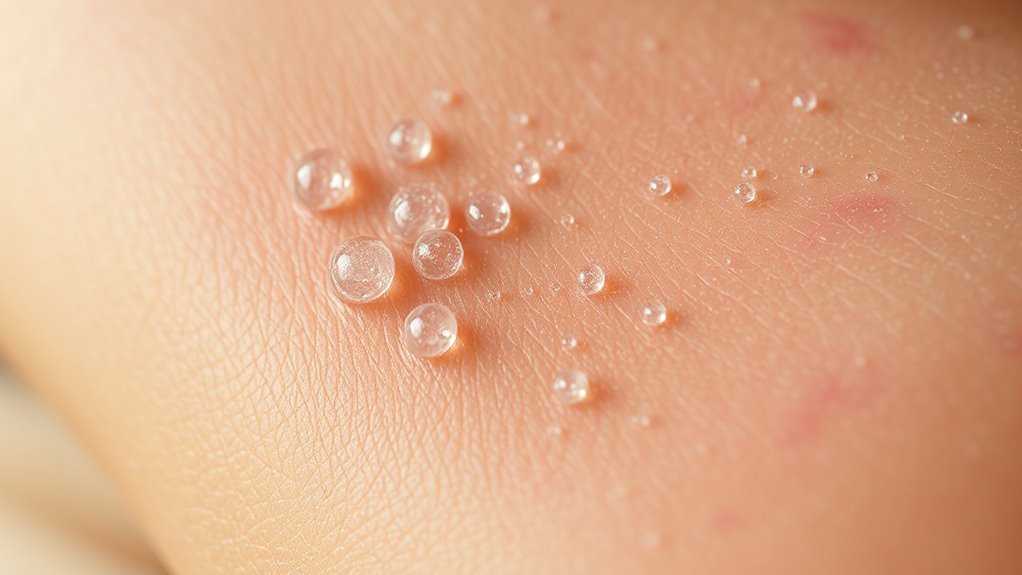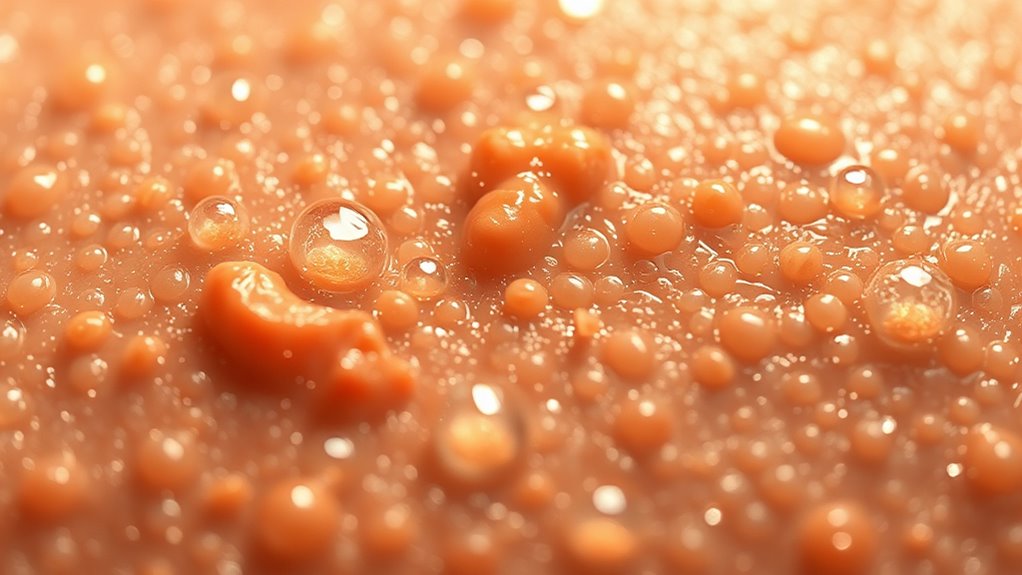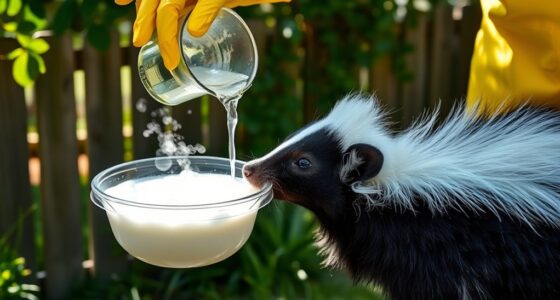Body odor happens when sweat from different glands interacts with the bacteria living on our skin, which break down sweat into smelly compounds. Our skin chemistry, influenced by genetics and hormonal changes, also plays a big role in how strong or distinct the odor is. The amount of sweat we produce and the bacteria’s activity together create that familiar scent. If you want to understand more about how these factors work, there’s plenty to explore.
Key Takeaways
- Body odor results from bacteria breaking down sweat on the skin, producing odorous compounds.
- Sweat, especially from apocrine glands, interacts with skin bacteria to generate distinctive scents.
- Skin chemistry, influenced by genetics and hormones, affects bacterial growth and odor intensity.
- Hormonal changes during puberty, menstruation, and menopause alter sweat production and odor.
- Hygiene and environmental factors impact bacterial activity and the development of body odor.

Body odor is something most of us want to avoid, but understanding what causes it can help us manage or prevent it effectively. One of the key factors influencing body odor is our genetics. Some people are naturally predisposed to stronger or more noticeable body odors because of genetic factors that affect sweat gland activity and skin chemistry. For instance, certain genes determine how much sweat we produce and how our sweat interacts with bacteria on our skin. If you have a genetic predisposition for more active sweat glands or specific skin compositions, you might notice a more pungent smell even if you practice good hygiene. This isn’t something you can totally control, but being aware of your genetic makeup can help you take extra precautions, like choosing the right deodorants or clothing that minimizes odor.
Genetics influence body odor, affecting sweat production and skin chemistry beyond personal hygiene efforts.
Hormonal changes also play a significant role in body odor. During puberty, hormonal fluctuations ramp up sweat production, especially from apocrine glands found in areas like the armpits and groin. These glands produce a thicker, protein-rich sweat that bacteria love to feed on, resulting in stronger odors. Similarly, hormonal shifts during pregnancy, menstruation, or menopause can cause increases in sweat and alter skin chemistry, making body odor more prominent or change its character. I’ve noticed, personally, that my body odor tends to be more intense around certain times of the month or during hormonal therapy, which makes sense given these biological shifts.
Additionally, hormonal changes can influence the types of bacteria thriving on your skin, further affecting how your body odor develops. For example, elevated levels of estrogen or testosterone can stimulate sweat glands and change skin chemistry, creating an environment where certain bacteria flourish. This, in turn, produces the characteristic smell we associate with body odor. It’s fascinating how interconnected these processes are—your hormonal state directly impacts your skin’s bacterial ecosystem and, consequently, your scent profile. Interestingly, microbial activity on the skin is also influenced by external factors such as hygiene practices and environmental conditions.
In essence, genetic factors and hormonal changes are fundamental in shaping our body odor. While we can’t alter our genetics, understanding their influence can help us adopt targeted hygiene routines or lifestyle adjustments. Recognizing when hormonal shifts might cause more odor allows us to be proactive—whether that’s through better hygiene, clothing choices, or medical advice. By learning what’s happening inside our bodies, we can better manage body odor without feeling self-conscious, knowing that these biological factors are natural and often beyond our immediate control.
Frequently Asked Questions
Can Diet Influence Body Odor?
Yes, diet impact definitely influences body odor. I’ve noticed that certain foods, like spicy dishes, garlic, and onions, can make my scent stronger. Food influence on body odor happens because what we eat affects our sweat and skin chemistry, feeding bacteria that produce odor. Adjusting my diet by reducing those pungent foods helps me stay fresher. So, what you eat truly plays a role in how your body smells.
Do Hormonal Changes Affect Body Odor?
Hormonal changes definitely influence body odor, like how a sudden storm alters the weather. During hormonal fluctuations, my endocrine system shifts, increasing sweat production and changing skin chemistry. This creates a different scent, often stronger or more pungent. These fluctuations happen during puberty, menstruation, or stress, and can make body odor more noticeable. I’ve learned that managing stress and maintaining hygiene helps, but hormonal shifts naturally impact how we smell.
How Does Stress Impact Body Odor?
When I’m stressed, stress-related sweating kicks in, mainly driven by increased cortisol levels. This type of sweat is different because it’s produced by apocrine glands, which bacteria love to feed on, creating stronger body odor. I notice my scent becomes more noticeable during stressful moments, so managing stress through relaxation techniques can help reduce stress-related sweating and, consequently, body odor.
Is Body Odor Hereditary?
You might find it interesting that body odor can be hereditary, often due to genetic traits influencing odor inheritance. It’s no coincidence that some people naturally have a stronger or different smell than others. I’ve noticed that family members share similar scent profiles, which suggests genetics play a role. While hygiene helps, your genetic makeup substantially impacts how your body odor develops, making it partly hereditary.
Can Deodorants Permanently Eliminate Body Odor?
Deodorants can’t permanently eliminate body odor, but they can substantially improve deodorant effectiveness for long-term odor control. I’ve found that regular application helps keep odor at bay, especially when combined with good hygiene. However, since sweat and bacteria are ongoing, I recommend reapplying throughout the day. For lasting results, consider antiperspirants, which reduce sweat production, providing better long-term odor control.
Conclusion
Think of your body as a garden, where bacteria are tiny gardeners tending to sweat and skin chemistry. When these gardeners get busy without proper care, they produce an unpleasant scent—body odor. Just like a garden needs tending, I’ve learned that good hygiene and understanding your skin’s needs keep this garden fresh and vibrant. Taking care of ourselves isn’t just about smell—it’s about nurturing a healthy, happy life.









